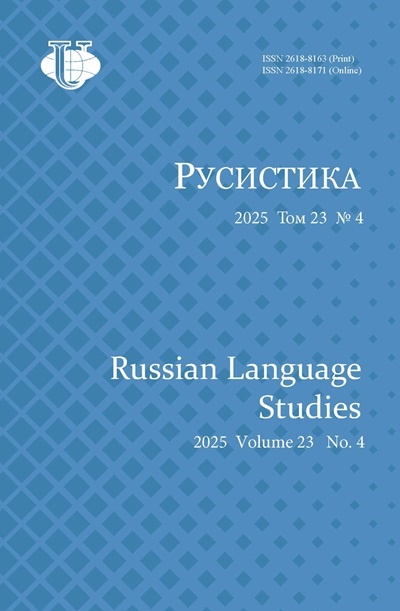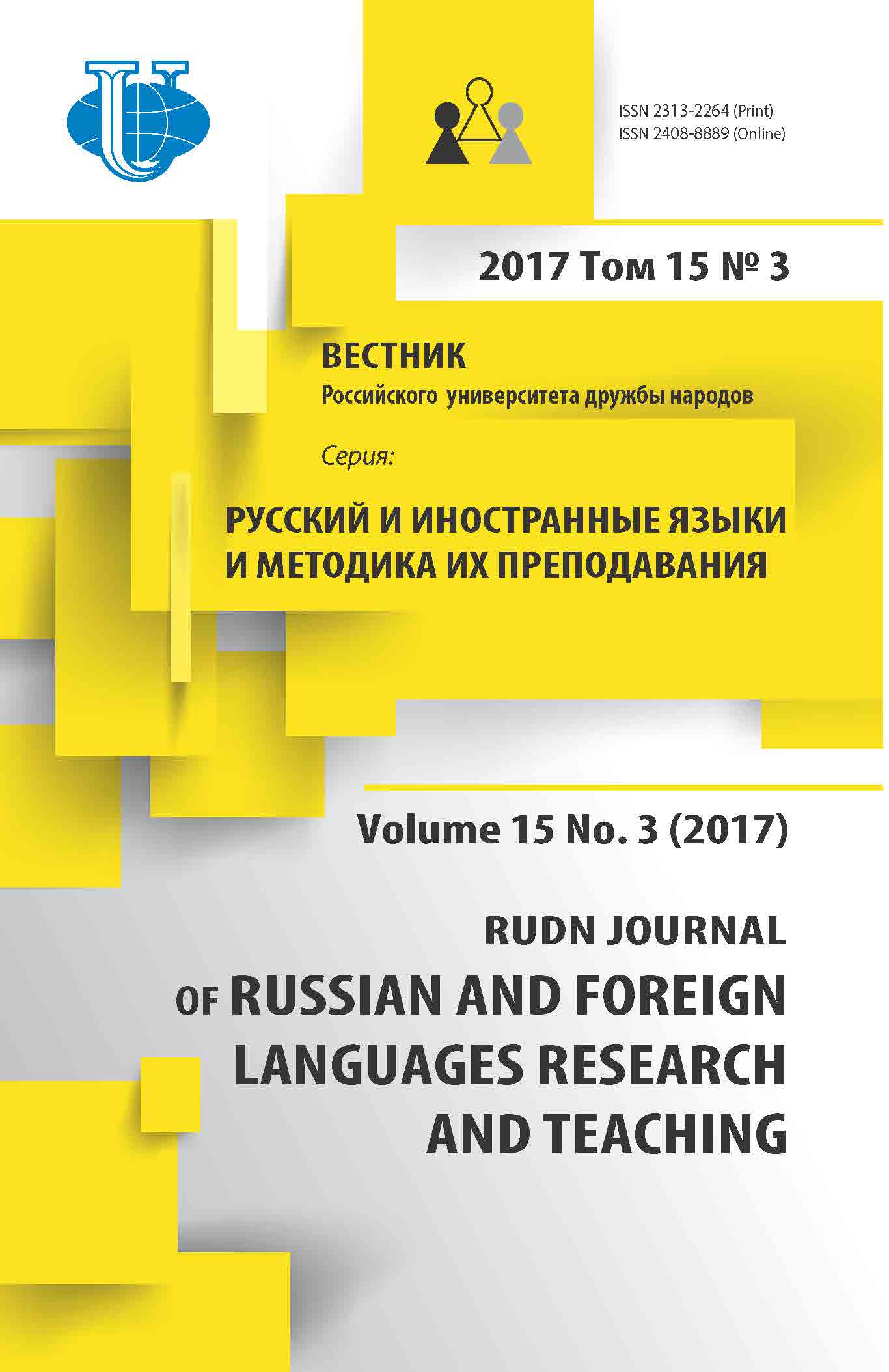ФРАЗЕОЛОГИЯ КАК КУЛЬТУРНЫЙ КОД ПОЗНАНИЯ И ДУХОВНОЕ НАСЛЕДИЕ ПРЕДКОВ
- Авторы: Буянова ЛЮ1
-
Учреждения:
- Кубанский государственный университет
- Выпуск: Том 15, № 3 (2017)
- Страницы: 285-298
- Раздел: Статьи
- URL: https://journals.rudn.ru/russian-language-studies/article/view/16904
- DOI: https://doi.org/10.22363/2313-2264-2017-15-3-285-298
- ID: 16904
Цитировать
Полный текст
Аннотация
Данная статья посвящена актуальной проблеме современной лингвистики - изучению фразеологии как когнитивно-семиотического «слоя» русской лингвокультуры, в единицах которого органично сопряжены разнофакторные знания о жизни народа и его духовном наследии. Цель статьи - показать когнитивную и функционально-семантическую уникальность русских фразеологических единиц (ФЕ) как культурно-конфессиональных маркеров и операциональных единиц, посредством которых формируется русская фразеологическая карти-на мира. Материалом статьи послужили различного типа ФЕ, извлеченные методом сплошной выборки из авторитетных фразеологических словарей и сборников русских пословиц и по-говорок. Ключевым выступает описательный метод, применялись также методы когнитивного анализа, семантического моделирования, интерпретационный анализ. Впервые анализ ФЕ выполняется в рамках нового направления современной лингвокультурологии, разрабатыва-емого автором, - лингвоконфессиологии, а ФЕ интерпретируется как культурно-конфессиональный знак, как сложный фразеоконфессионим. Данный аспект исследования позволяет сделать актуальный вывод о том, что ФЕ представляют собой этнокультурно и конфессионально маркированную знаковую структуру как результат членения и категоризации мира. Результатом авторских наблюдений стало выводное знание о том, что во фразеологическом ярусе национального языка представлен во всей полноте и уникальности образ национальной души, раскрыта цивилизационная эволюция самого этноса и его нравственно-духовные и конфессиональные ценности, стереотипы, опыт, мудрость; разработана и имплицитно выражена национальная программа обустройства своего мира и жизни.
Об авторах
Л Ю Буянова
Кубанский государственный университет
Автор, ответственный за переписку.
Email: lub_prof@mail.ru
Буянова Людмила Юрьевна, доктор филологических наук, профессор, профессор кафедры общего и славяно-русского языкознания ФГБОУ ВО «Кубанский государственный университет»; основатель научной школы «Функциональная терминологическая дериватология и семиотика языка науки». Академик АПСН РФ (Академии педагогических и социальных наук РФ); член-корреспондент РАЕН (Российской академии естественных наук); профессор РАЕ (Российской академии естествознания); Член РоссТерма. Ветеран труда. Сфера научных интересов: фразеология, лингвоконфессиология и лингвоконцептология, когнитивная дериватология, терминологическая деривация языка науки, лингвистика предметной области, языковая концептуализация и категоризация, эмотивность и эмоциогенность языка, семиотика. Автор более 390 научных публикаций, в том числе 2 словарей, 8 монографий, 12 глав в десяти коллективных монографиях.
ул. Ставропольская, 149, Краснодар, Россия, 350040Список литературы
- Буянова Л.Ю., Коваленко Е.Г. Русский фразеологизм как ментально-когнитивное средство языковой концептуализации сферы моральных качеств личности. М.: Флинта; Наука, 2012. 184 с.
- Будагов Р.А. Очерки по языкознанию. М.: Изд-во Академии наук СССР, 1953. 279 с.
- Булаховский Л.А. Введение в языкознание. Ч. II. М.: Учпедгиз, 1954. 175 с.
- Финкель А.М., Баженов Н.М. Современный русский литературный язык. Киев: Радянська школа, 1954. 540 с.
- Реформатский А.А. Введение в языкознание. М.: Учпедгиз, 1955. 402 с.
- Реформатский А.А. Введение в языкознание. М.: Учпедгиз, 1960. 432 с.
- Алефиренко Н.Ф. Фразеология в свете современных лингвистических парадигм. М.: ЭЛПИС, 2008. 272 с.
- Телия В.Н. О термине «фразема» // Проблемы лингвистического анализа. М.: Наука, 1966. С. 186-199.
- Алефиренко Н.Ф. Фразеология в системе современного русского языка. Волгоград: Перемена, 1993. 149 с.
- Семененко Н.Н. Русские паремии: функции, семантика, прагматика. Старый Оскол: РОСА, 2011. 353 с.
- Жуков В.П. Семантика фразеологических оборотов. М.: Просвещение, 1978. 160 с.
- Атеистический словарь. М.: Политиздат, 1986. 512 с.
- Буянова Л.Ю. Лингвоконфессиология в системе современной гуманитарной гносеосферы: методологический инструментарий и понятийный аппарат // Мова: науково-теоретичний часопис з мовознавства. № 21. Украина, Одесса: Астропринт, 2014. С. 23-27.
- Даль В.И. Толковый словарь живого великорусского языка: в 4-х т. М.: Русский язык, 1989. 2289 с.
- Зимин В.И., Спирин А.С. Пословицы и поговорки русского народа. Объяснительный словарь. М.: Сюита, 1996. 544 с.
- Маслова В.А. Лингвокультурология. М.: Академия, 2001. 183 с.
- Степанов Ю.С. Константы: Словарь русской культуры. М.: Академия, 2001. 990 с.
- Семененко Н.Н. Русская пословица как объект лингвокультурологического анализа // Фразеология-2000. Тула: Изд-во Тул. гос. пед. ун-та им. Л.Н. Толстого, 2000. С. 101-103.
- Фархутдинова Ф.Ф. Роль паремий в лингвокультурологических исследованиях // Фразеология-2000. Тула: Изд-во Тул. гос. пед. ун-та им. Л.Н. Толстого, 2000. С. 100-101.
- Пословицы русского народа: сборник пословиц В.И. Даля: В 3-х т. М.: Русская книга, 1993. Т. 1. 637 с.
- Фрумкина Р.М. Цвет, смысл, сходство: аспекты психолингвистического анализа. М.: Наука, 1984. 175 с.
- Голубь Л.А. Сквозные мотивы языковой картины мира (на примере лексико-семантического поля «Цвет» в английском и русском языках): автореф. дисс. … канд. филол. наук. М., 2006. 19 с.
- Серов Н.В. Цвет культуры. СПб.: Речь, 2003. 672 с.
- Серов Н.В. Эстетика цвета. Методологические аспекты хроматизма. СПб.: ФПО-ТОО «БИОНТ», 1997. 64 с.
- Фразеологический словарь русского языка / под ред. А.И. Молоткова. М.: Русский язык, 1978. 543 с.
- Лебедева Л.А. Устойчивые сравнения русского языка: тематический словарь. М.: Флинта; Наука, 2013. 316 с.
Дополнительные файлы














